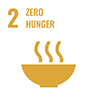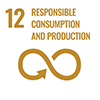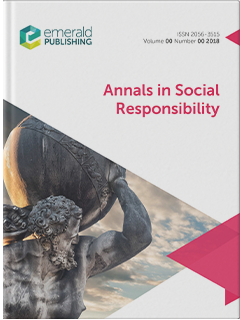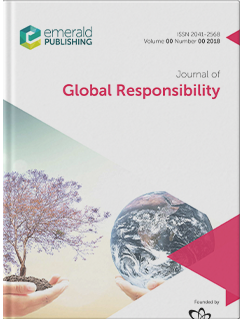This journal only publishes commissioned content, please do not submit speculative manuscripts.
Submit to the journal
Submissions to Annals in Social Responsibility are made using ScholarOne Manuscripts, the online submission and peer review system. Registration and access is available at http://mc.manuscriptcentral.com/ann_sr. For information and guidance on using ScholarOne Manuscripts, go to the ScholarOne help pages: http://mchelp.manuscriptcentral.com/gethelpnow/.
Registering on ScholarOne Manuscripts
If you have not yet registered on ScholarOne Manuscripts, please follow the instructions below:
- Please log on to: http://mc.manuscriptcentral.com/ann_sr
- Click on Create Account
- Follow the on-screen instructions, filling in the requested details before proceeding
- Your username will be your email address and you have to input a password of at least 8 characters in length and containing two or more numbers
- Click Finish and your account has been created.
Submitting an article to Annals in Social Responsibility on ScholarOne Manuscripts
- Please log on to Annals in Social Responsibility at http://mc.manuscriptcentral.com/ann_sr with your username and password. This will take you through to the Welcome page (To consult the Author Guidelines for this journal, click on the Home Page link in the Resources column)
- Click on the Author Centre button
- Click on the submit a manuscript link which will take you through to the Manuscript Submission page
- Complete all fields and browse to upload your article
- When all required sections are completed, preview your .pdf proof
- Submit your manuscript
Proposal Submission
Annals in Social Responsibility does not accept article submissions without the initial submission of a proposal.
The objective of the proposal process is to be efficient in the processing of articles. We want to know "what" you are going to say, "to whom" you are going to say it, "why" what you are saying is important, and "how" you are going to convince your audience of the veracity of your argument. This allows the editorial team to provide author(s) with information that facilitates the review process, while allowing us to be proactive in working with authors. Proposals should be no longer than 5 pages single‐spaced with standard 1‐inch margins and in a 12‐point font.
The proposal must include the following information with the following headings:
The idea: The specific important and innovative idea that is going to be the focus of the article. This should not be long‐winded literal description but be a clear and concise statement of the big/new idea that is at the core of what you are doing.
To whom is the article speaking: While ASR is clearly speaking to other scholars interested in issues of social responsibility, it is important to frame your paper in a specific topical and disciplinary area in the first instance. Hence, you need to outline who might be the primary audience for your article. For instance, is it the legal community, anthropologists, or marketing scholars (i.e., to what extent is it disciplinary?)? Is it those interested in human rights, CSR performance, or social innovation (i.e., to what extent is it phenomenon or topic based?)?
The importance of the idea: Why is your paper important? This needs to be understood as you address how you are going to take your specific knowledge and frame it in a way that resonates with your audience. In other words, why is it important to your readership and not just to you?
How are you going to justify, defend and communicate your idea: What is the theoretical and/or empirical evidence the article will be presenting in order to convince your audience of the veracity and importance of your idea? If you have specific data sources, outline what these are. If you are building a theoretical argument, then outline how you are going to logically justify and defend that argument. If your paper is empirical, provide a brief New Journal Call for Manuscript Proposals Annals in Social Responsibility overview of your methods (e.g., experimental design, econometric model, statistical testing, etc.).
The submission process
All manuscripts should be submitted through our editorial system by the corresponding author.
The only way to submit to the journal is through the journal’s ScholarOne site as accessed via the Emerald website, and not by email or through any third-party agent/company, journal representative, or website. Submissions should be done directly by the author(s) through the ScholarOne site and not via a third-party proxy on their behalf.
A separate author account is required for each journal you submit to. If this is your first time submitting to this journal, please choose the Create an account or Register now option in the editorial system. If you already have an Emerald login, you are welcome to reuse the existing username and password here.
Please note, the next time you log into the system, you will be asked for your username. This will be the email address you entered when you set up your account.
Don't forget to add your ORCiD ID during the submission process. It will be embedded in your published article, along with a link to the ORCiD registry allowing others to easily match you with your work.
Don’t have one yet? It only takes a few moments to register for a free ORCiD identifier.
Visit the ScholarOne support centre for further help and guidance.
Review process
Each paper is reviewed by the editor and, if it is judged suitable for this publication, it is then sent to two independent referees for double-anonymous peer review.
Manuscript transfer service
Emerald’s manuscript transfer service takes the pain out of the submission process if your manuscript doesn’t fit your initial journal choice. Our team of expert Editors from participating journals work together to identify alternative journals that better align with your research, ensuring your work finds the ideal publication home it deserves. Our dedicated team is committed to supporting authors like you in finding the right home for your research.
If a journal is participating in the manuscript transfer program, the Editor has the option to recommend your paper for transfer. If a transfer decision is made by the Editor, you will receive an email with the details of the recommended journal and the option to accept or reject the transfer. It’s always down to you as the author to decide if you’d like to accept. If you do accept, your paper and any reviewer reports will automatically be transferred to the recommended journals. Authors will then confirm resubmissions in the new journal’s ScholarOne system.
Our Manuscript Transfer Service page has more information on the process.
Frequently Asked Questions
The only time we will ever ask you for money to publish in an Emerald journal is if you have chosen to publish via the gold open access route. You will be asked to pay an APC (article-processing charge) once your paper has been accepted (unless it is a sponsored open access journal), and never at submission.
Read about our APCs
At no other time will you be asked to contribute financially towards your article’s publication, processing, or review. If you haven’t chosen gold open access and you receive an email that appears to be from Emerald, the journal, or a third party, asking you for payment to publish, please contact our support team via [email protected].













